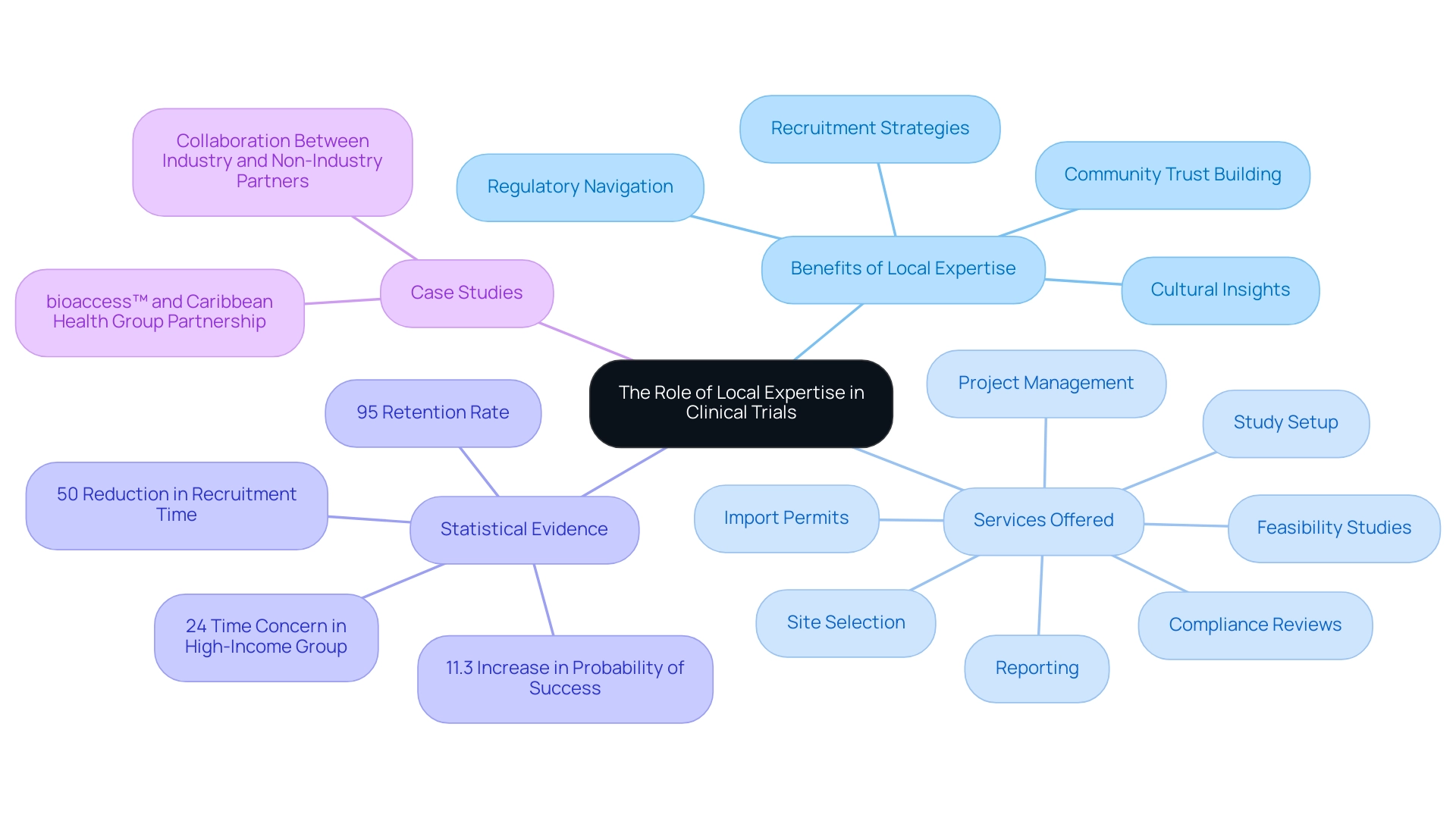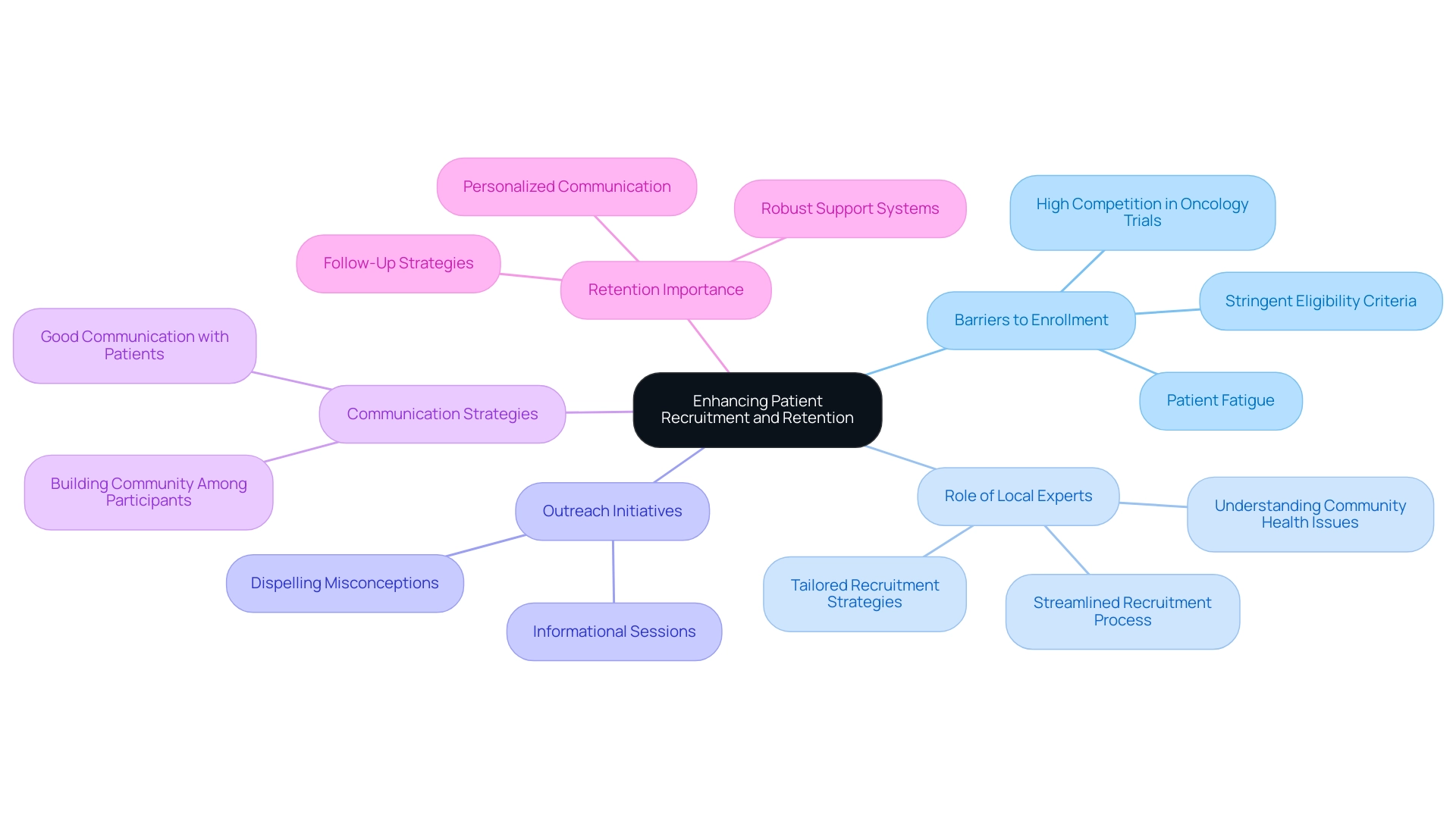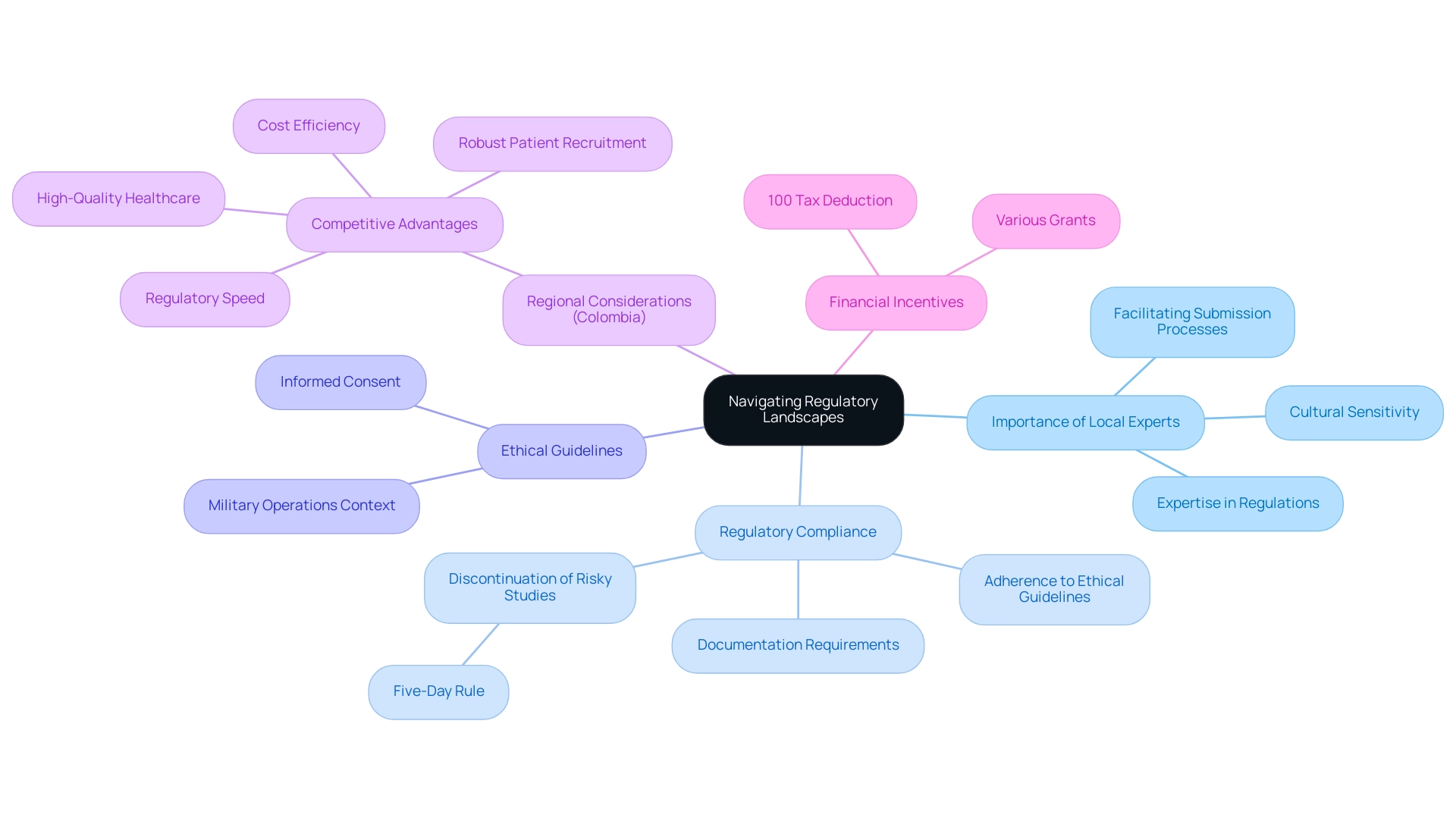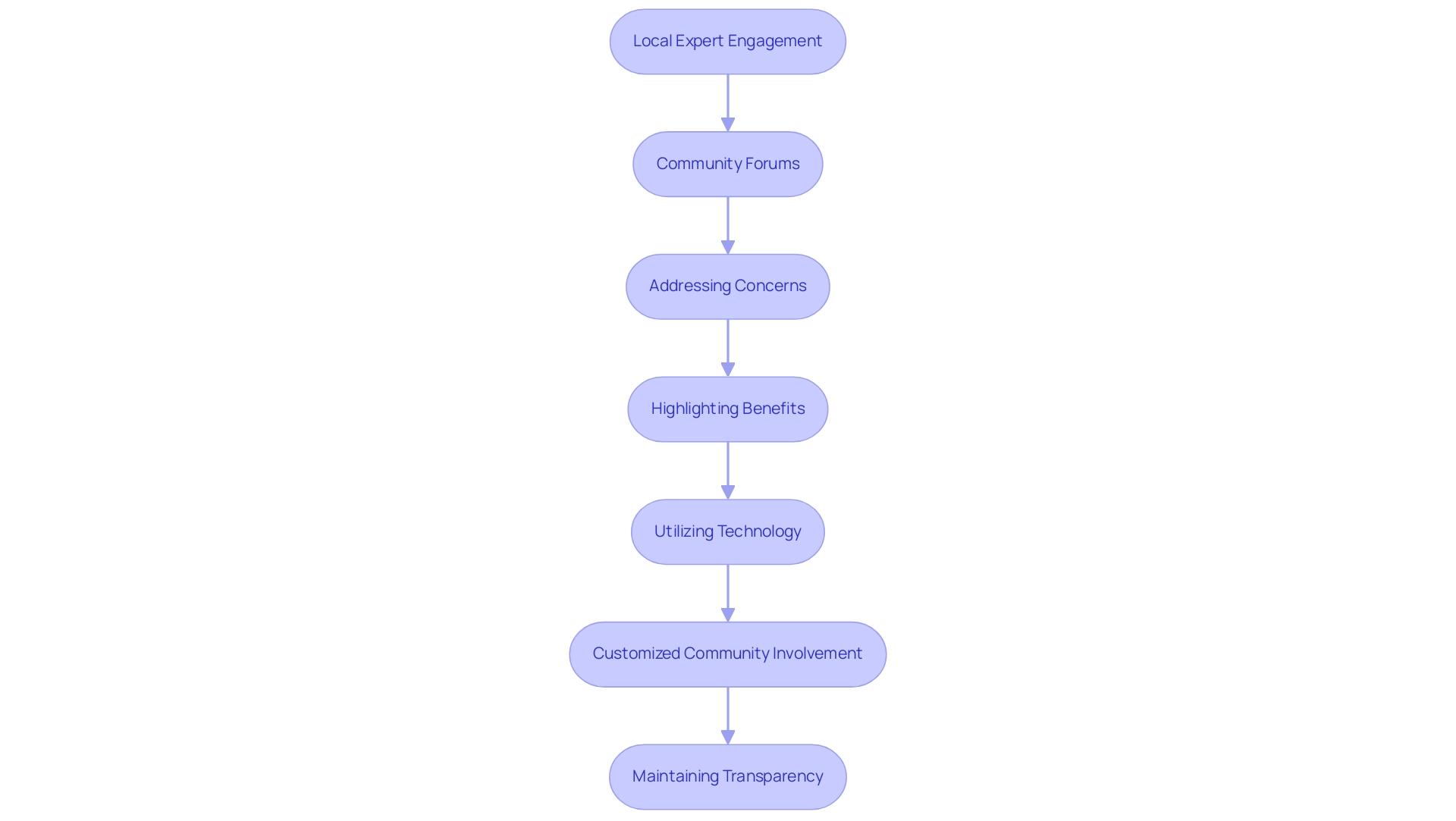Overview
Partnering with local experts for clinical trials is important because their regional knowledge enhances recruitment strategies, streamlines compliance with regulations, and builds trust within communities, ultimately leading to improved study outcomes. The article illustrates this by providing evidence that local expertise results in higher enrollment rates, faster recruitment times, and a more reliable data collection process, which are critical for the success of clinical research initiatives.
Introduction
In the realm of clinical trials, the significance of local expertise cannot be overstated. As the landscape of medical research evolves, the role of professionals who understand regional nuances becomes increasingly critical. Their intimate knowledge of cultural contexts, patient demographics, and regulatory frameworks not only enhances the recruitment and retention of trial participants but also ensures that studies are conducted ethically and efficiently.
By fostering trust within communities and leveraging established relationships, these experts can navigate the complexities of clinical trials, ultimately contributing to more reliable and impactful research outcomes. This article delves into the multifaceted benefits of local expertise in clinical trials, highlighting how it drives success in patient engagement, regulatory compliance, and community trust.
The Crucial Role of Local Expertise in Clinical Trials
The Importance of Partnering with Local Experts for Clinical Trials is evident as local knowledge plays a crucial role in the success of research studies, profoundly influencing various outcomes. The importance of partnering with local experts for clinical trials is evident as professionals familiar with the regional healthcare landscape bring invaluable insights into cultural nuances, patient demographics, and specific regulatory requirements. As Reus & Lamont found, cultural differences can be exacerbated by regional distance, complicating communication and collaboration.
This localized knowledge highlights the importance of partnering with local experts for clinical trials, enabling professionals to develop recruitment strategies that connect with potential participants, significantly enhancing enrollment rates and ensuring diverse representation in studies. Statistics show that when non-industry partners are involved, there is an observed increase of 11.3 percentage points in the probability of success (POS) for drug development projects. Moreover, partnerships such as the one between bioaccess™ and Caribbean Health Group, which seeks to change Barranquilla into a prominent center for research studies, illustrate The Importance of Partnering with Local Experts for Clinical Trials and the beneficial effect of community involvement on study results.
The extensive research management services offered by bioaccess™ and CHG encompass:
- feasibility studies
- site selection
- compliance reviews
- study setup
- import permits
- project management
- reporting
These services further improve the effectiveness of regional collaborations. Furthermore, 24% of individuals in the highest income group mention time as a concern for engaging in trials, highlighting a barrier that regional experts can assist in overcoming. They are skilled at navigating the regulatory framework, ensuring compliance with regional laws and ethical standards.
Their established relationships within the community build trust, underscoring the importance of partnering with local experts for clinical trials to encourage participation in clinical research. For instance, a regional investigator may pinpoint particular community health concerns that guide study design, improving the study's significance and influence. Moreover, close communication between sponsors and collaborators is crucial for success, allowing for a more streamlined process.
Ultimately, the importance of partnering with local experts for clinical trials is that it not only streamlines operational processes but also enriches the quality of data collected, resulting in findings that are more reliable and generalizable across populations. The backing from Colombia's Minister of Health further highlights the significance of this initiative, strengthening the dedication to making Barranquilla a prime location for research studies. Significantly, GlobalCare Clinical Trials has reported over a 50% reduction in recruitment time and a 95% retention rate, showcasing the tangible benefits of such regional collaborations.

Enhancing Patient Recruitment and Retention
A major barrier in medical studies is successful patient enrollment and retention, underscoring the importance of partnering with local experts for clinical trials to effectively tackle these issues. Their deep understanding of community health issues highlights the importance of partnering with local experts for clinical trials, enabling them to create outreach initiatives that resonate with potential participants. For instance, by organizing informational sessions, local experts can dispel common misconceptions surrounding the importance of partnering with local experts for clinical trials, thereby alleviating fears and uncertainties.
However, as one non-includer pointed out, 'Yes, really tired of studying, I clearly notice that.' [...] Individuals also understand that they are in a study practice. And they will be asked more often, but they have also learned to say no.
This highlights the fatigue that potential participants may feel from frequent recruitment requests, which can hinder enrollment efforts. Moreover, the study on oncology research recruitment challenges confirmed that oncology studies face more recruitment difficulties than other fields, emphasizing the need for tailored recruitment strategies in cancer research to enhance participant enrollment. The efficiency of identifying suitable candidates and streamlining the recruitment process underscores the importance of partnering with local experts for clinical trials, given their familiarity with regional healthcare systems.
Retention is equally vital, as high dropout rates can jeopardize the integrity of study findings. Comprehensive clinical study management services, including feasibility studies, site selection, compliance reviews, setup, import permits, project management, and reporting, play a crucial role in this regard. The importance of partnering with local experts for clinical trials is highlighted by their ability to adopt tailored follow-up strategies that cater to participant needs, such as personalized communication and robust support systems, which significantly enhance commitment to the study.
Good communication between researchers and participating patients is essential, as it facilitates further recruitment and retention efforts. Moreover, the importance of partnering with local experts for clinical trials is highlighted by their ongoing participation, which cultivates a sense of community among participants, a crucial element for maintaining interest and involvement throughout the duration of the study. This proactive approach not only mitigates recruitment challenges but also fosters a supportive environment that encourages participant retention, ultimately demonstrating the importance of partnering with local experts for clinical trials in contributing to the economic growth and healthcare improvement of local communities.
Furthermore, media reporting on research studies in Latin America, including Colombia, by platforms like Clinical Leader highlights the significance of transparency and awareness in the research process, additionally promoting involvement. By incorporating extensive research study management services, we can improve the overall recruitment and retention strategies, ensuring successful study outcomes.

Navigating Regulatory Landscapes with Local Knowledge
The regulatory environment overseeing research studies presents a multitude of complexities that differ markedly across regions, emphasizing the importance of partnering with local experts for clinical trials who specialize in comprehensive research management services. These professionals possess a profound understanding of the pertinent laws, regulations, and ethical guidelines that dictate clinical research. Their expertise can greatly shorten approval timelines by ensuring that all documentation—spanning feasibility studies and site selection to compliance reviews and setup for testing—is carefully prepared and in accordance with regional standards.
For instance, regional experts can facilitate the submission process to ethics committees (IRB/EC) and INVIMA, proactively addressing specific concerns while navigating the necessary import permits. Moreover, their perspectives on culturally sensitive matters can improve the reliability of protocols, ensuring that designs are considerate of local customs and values. In Colombia, where competitive advantages such as cost efficiency, regulatory speed, high-quality healthcare, and robust patient recruitment exist, the importance of partnering with local experts for clinical trials is crucial as their localized knowledge helps diminish the risks associated with regulatory non-compliance and fosters a conducive environment for research advancement.
Significantly, sponsors must cease studies showing unreasonable risks to participants within five working days of such findings, highlighting the importance of adherence in medical research. Furthermore, ethical considerations, as illustrated in military operations, highlight that informed consent may be waived under specific conditions, necessitating careful navigation of ethical guidelines in urgent contexts. Thus, keeping proper documentation of investigational products and following compliance requirements are essential to the success of research studies, especially in varied and changing regulatory environments.
Furthermore, it is essential to take into account the R&D tax and financial incentives offered in Colombia, which can greatly aid companies investing in medical studies, including a 100% tax deduction and various grants.

Building Trust and Relationships within the Community
Building trust within the community is crucial for the successful implementation of clinical studies. Local experts, equipped with established connections and a respected reputation, demonstrate the importance of partnering with local experts for clinical trials by being uniquely positioned to build and maintain these vital relationships. By actively engaging with community leaders and organizations, they can create partnerships that highlight the importance of partnering with local experts for clinical trials, which will elevate the visibility of the initiative and emphasize its potential benefits, such as job creation and healthcare improvements.
For example, organizing community forums enables regional experts to outline the project's objectives, address any concerns, and showcase the positive impacts for both participants and the broader community. Their capacity to convey with empathy and clarity is vital in dispelling common myths about clinical studies, thus encouraging greater participation. Moreover, by engaging community stakeholders in the investigative process, local specialists can demonstrate the importance of partnering with local experts for clinical trials to ensure that experiments are viewed as cooperative efforts instead of outside impositions.
This approach not only aids in participant recruitment but also cultivates a sense of ownership and investment in the research outcomes, ultimately leading to more impactful and meaningful results. As emphasized by recent discoveries, 53% of individuals think that well-conducted studies can positively impact the world, reinforcing the need for effective community engagement strategies. Moreover, utilizing tools and technology, such as electronic patient-reported outcomes (ePRO), can enhance enrollment for hard-to-reach populations, further boosting participation.
It is essential to tackle the particular obstacles encountered by under-represented groups, as demonstrated by the case study on distrust among disabled individuals in studies, which highlights the necessity for customized community involvement strategies alongside thorough clinical management services. Moreover, ensuring compliance with country requirements and obtaining ethics committee approvals are vital steps in the trial setup process, along with diligent reporting on study status and adverse events, which are essential for maintaining transparency and trust throughout the research process.

Conclusion
Local expertise is undeniably a cornerstone of successful clinical trials, influencing key outcomes across various dimensions. Professionals with local knowledge enhance recruitment and retention strategies by tailoring outreach initiatives to resonate with community members, thus addressing prevalent concerns and misconceptions. Their familiarity with the healthcare landscape allows for more effective identification of suitable participants while also fostering a supportive environment that encourages commitment throughout the trial duration.
Furthermore, navigating the intricate regulatory frameworks associated with clinical research is made significantly more efficient through the insights of local experts. Their expertise not only accelerates approval processes but also ensures that studies are compliant with ethical standards and culturally sensitive, thereby reinforcing the credibility of the research. This dual focus on regulatory adherence and community engagement ultimately elevates the quality of data collected, leading to findings that are both reliable and applicable across diverse populations.
Building trust within communities is paramount for the success of clinical trials. Local professionals, through their established relationships and proactive engagement strategies, cultivate a sense of ownership among participants and stakeholders alike. By emphasizing the potential benefits of clinical trials to the community, they help to dispel myths and encourage wider participation. As the field of clinical research continues to evolve, the critical role of local expertise will remain a defining factor in driving impactful and trustworthy research outcomes, ensuring that trials not only benefit the scientific community but also the communities they engage.




